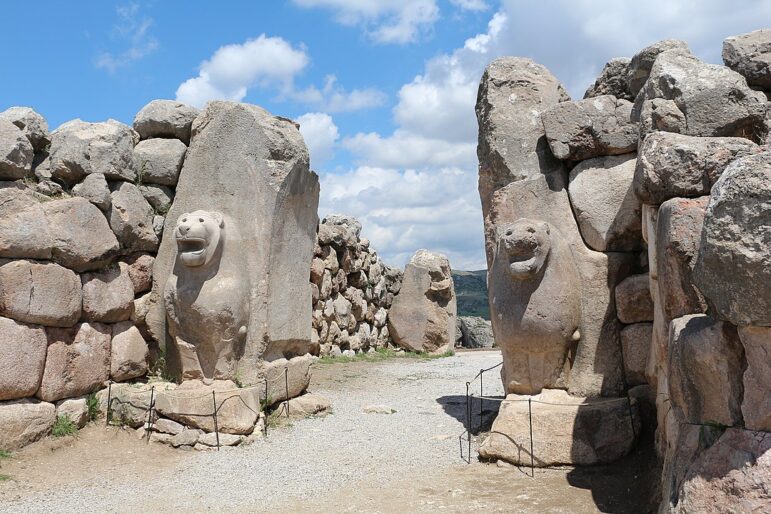
BOĞAZKALE, TURKEY – Scientists at Boğazköy-Hattusha, a UNESCO World Heritage site in northwestern Turkey, have discovered a fragment of a previously undiscovered Indo-European language. The fragment was found inscribed on a clay tablet, one of more than 30,000 such tablets at Boğazköy-Hattusha, which was the capital of the Hittite Empire during their peak in the late Bronze Age.

The Lion Gate at Boğazköy-Hattusha, Turkey [Bernard Gagnon, Wikimedia Commons, CC 3.0]
Julius-Maximilians-Universität Würzburg provides the details of the discovery. Most of the clay tablets are, as expected, in the Hittite language, written in cuneiform letters. But as Daniel Schwemer, chair of the Ancient Near Eastern Studies department at the university, explained, in one tablet that recorded a cultic ritual text, the Hittites preserved a recitation from a different language.
“The Hittites were uniquely interested in recording rituals in foreign languages,” says Schwemer.
Other tablets, according to the university’s statement, have included recordings in two other Indo-European languages closely related to Hittite and one non-Indo-European language that bears no relationship to Hittite.
The tablet describes the newly discovered language as belonging to the region of Kalašma, likely near the modern province of Bolu, close to the Black Sea.
Currently we do not know what the passage says, although Elisabeth Rieken, a professor at Philipps-Universität Marburg who specializes in ancient Anatolian languages, says Kalašma appears to have similarities to the Luwian language, one of the other Anatolian-Indo-European languages the Hittites preserved.
Further work on Kalašma will continue, including more analysis of Kalašma’s relationship to other ancient Anatolian dialects.
Almost 46% of the world’s population speaks an Indo-European language as its first language, the largest share of any of the major language families – a fact abetted by speakers of European languages in the colonial period. Indo-European languages include Hindi, Iranian, and most European languages, including English and Spanish.
In addition to the study of the linguistic connections between the various language subgroups in the Indo-European family tree, many scholars and modern Pagans have investigated connections between the myths, culture, and religious beliefs of those descended from the Indo-Europeans. Many Indo-European cultures, for example, have a sky-father deity that descend linguistically and mythologically from a theorized figure named *Dyēus, who developed into the Indo-Iranian Dyáus, the Greek Zeus, the Latin Jove, and the Hittite Šiwat, among many others.
Boğazköy-Hattusha has been a UNESCO World Heritage site since 1986. Excavations at the site have been ongoing for more than a century. The current work is a joint project by the German Archeological Institute, Julius-Maximilians-Universität Würzburg, Philipps-Universität Marburg, and the University of Istanbul.
The Wild Hunt is not responsible for links to external content.
To join a conversation on this post:
Visit our The Wild Hunt subreddit! Point your favorite browser to https://www.reddit.com/r/The_Wild_Hunt_News/, then click “JOIN”. Make sure to click the bell, too, to be notified of new articles posted to our subreddit.